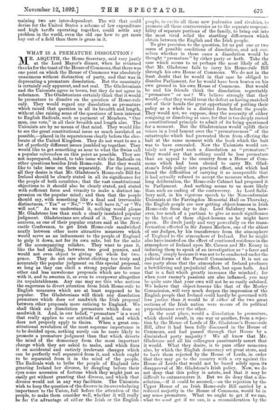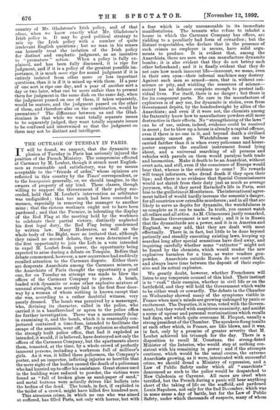WHAT IS A PREMATURE DISSOLUTION?
MR. ASQUITH, the Home Secretary, said very justly at the Lord Mayor's dinner, when he returned thanks for the toast of the House of Commons, that there was one point on which the House of Commons was absolutely unanimous without distinction of party, and that was in deprecating a premature dissolution. But the unanimity is certainly only apparent, and not real. The Gladstonians and the Unionists agree in terms, but they do not agree in substance. The Gladstonians certainly think that it would be premature to dissolve on the question of Home-rule only. They would regard any dissolution as premature which raised that question in all its breadth and length, without also raising some of the questions of keen interest to English Radicals, such as payment of Members, "One man, one vote," in all their breadth and length also. The Unionists are by no means of that mind. They would like to see the great constitutional issue as much insulated as possible,—placed in its separateness clearly before the elec- torate of the United Kingdom. They do not want to see a lot of perfectly different issues jumbled up together. They would like to get something as near to what the Swiss call a popular referendum on this point as possible. They are not unprepared, indeed, to take issue with the Radicals on other questions besides Irish Home-rule. But they would like to take issue on them separately. For the present, all they desire is that Mr. Gladstone's Home-rule Bill for Ireland should be clearly stated in all its significance for the people of both countries; that the vast constitutional objections to it should also be clearly stated, and stated with sufficient force and vivacity to make a distinct im- pression on the popular mind; and then that the people should say, with something like a final and irrevocable distinctness, "Yes" or "No," "We will have it," or "We will not." As we understand it, nothing would please Mr. Gladstone less than such a clearly insulated popular judgment. Gladstonians are afraid of it. They are very anxious, as one of their popular orators said at the New- castle Conference, to get Irish Home-rule sandwiched neatly between other more attractive measures which would serve as an inducement to the people of England to gulp it down, not for its own sake, but for the sake of the accompanying relishes. They want to pass it, like the bad shilling, between two good pennies, and would not even object to giving the whole for two- pence. They do not care about eliciting too truly and accurately the popular judgment on this special proposal, so long as they can elicit a strong popular desire for other and less unwelcome proposals which are to come with it, and to sweeten it, or even to overpower altogether its unpalatableness. Any one may see this who notices the eagerness to divert attention from Irish Home-rule to English measures which are at least supposed to be popular. The Gladstonians will think any dissolution premature which does not sandwich the Irish proposal between other proposals more enticing to England. We shall think any dissolution premature which does so sandwich it. And, in our belief, " premature" is a word that really applies to our attitude of mind, and which does not properly apply to theirs. When a great con- stitutional revolution of the most supreme importance is to be decided upon, nothing surely can be more likely to promote a premature judgment than that which diverts the mind of the democracy from the most important change which they are asked to make, and which fixes it on accidental and entirely irrelevant changes which can be perfectly well separated from it, and which ought to be separated from it in the mind of the people. The Radicals wish to bribe the people of England into granting Ireland her divorce, by dangling before their eyes some accession of fortune which they might just as easily get without granting that divorce, and which- that divorce would not in any way facilitate. The Unionists wish to keep the question of the divorce in its overwhelming importance to the Union, full before the attention of the people, to make them consider well, whether it will really be for the advantage of eider the Irish or the English people, to excite all these new jealousies and rivalries, to promote all these controversies as to the separate responsi- bility of separate portions of the family, to bring out into the most vivid relief the startling differences which obtain between the English and the Irish people. To give precision to the question, let us put one or two cases of possible conditions of dissolution, and ask our- selves whether in these cases a dissolution would be thought "premature" by either party or both. Take the case which seems to us perhaps the most likely of all, that Mr. Gladstone fails to carry his Home-rule Bill through his own House of Commons. We do not in the least doubt that he would in that case be obliged to dissolve Parliament, for he would have been beaten on his own ground in his own House of Commons. But would he and his friends think the dissolution regrettably " premature " or not ? We believe strongly that they would,—that they would treat the defeat as having snatched out of their hands the great opportunity of putting their policy as a whole in a distinct form before the people. They would not, we suppose, deny the necessity of either resigning or dissolving at once, for that is too deeply rooted a constitutional principle to admit of its being questioned for a moment. But the Gladstonians would uplift their voices in a loud lament over the " prematureness " of the catastrophe which had prevented them from offering the bait at the same moment with the hook which the bait was to have concealed. Now the Unionists would cer- tainly not regard such a dissolution as "premature." They would say that nothing could be less premature than an appeal to the country from a House of Com- mons which had been elected to carry Mr. Glad- stone's Irish policy into practical effect, and which had found the difficulties of carrying it so insuperable that it had actually refused to accept the measure when, after long deliberation, the Home-rule Cabinet had proposed it to Parliament. And nothing seems to us more likely than such an ending of the controversy. As Lord Salis- bury said, in his vigorous speech to the Nonconformist Unionists at the Farringdon Memorial Hall on Thursday, the English people are now getting object-lessons in Irish Home-rule from day to day. Lord Salisbury was, how- ever, too much of a partisan to give as much significance to the latest of these object-lessons as he might have given. He dwelt justly and very powerfully on the trans- formation effected in Sir James Mathew, one of the ablest of our Judges, by his transference from the atmosphere of England to the atmosphere of Ireland. But he might also have insisted on the effect of continued residence in the atmosphere of Ireland upon Mr. Carson and Mr. Kenny in inducing them to speak of an investigation as "a farce and a sham," simply because it was not to be conducted under the judicial forms of the Parnell Commission. It is not on one party alone that the atmosphere of Ireland produces a bewildering and prejudicial effect, but upon both. And that is a fact which greatly increases the mischief ; for when your enemy's passions are also inflamed, you may be quite sure that your own will not be so easily subdued. We believe that object-lessons like that of the Morley Commission, will very much deepen the impression of the English people that Ireland could hardly be governed with less justice than it would be if either of the two great sections of the Irish nation were secure of its political preponderance over the other. In the next place, would a dissolution be premature, which should result, in one way or another, from a rejec- tion by the House of Lords of Mr. Gladstone's Home-rule Bill, after it had been fully discussed in the House of Commons, and had passed through that House by a diminished party majority ? We all know that Mr. Gladstone and all his colleagues passionately assert that it would. What they desire, is to pass other measures also, by which the English democracy set great store, and to have them rejected by the House of Lords, in order that they may go to the country with a cry against the House of Lords that would not be based solely upon its disapproval of Mr. Gladstone's Irish policy. Now, we do not deny that this policy is astute, and that it may be difficult to outmanceuvre it. But we do deny that a dis- solution,—if it could be secured,—on the rejection by the Upper House of an Irish Home-rule Bill carried by a reduced majority in the House of Commons, would be in any sense premature. What we ought to get if we can, what we must get if we can, is a reconsideration by the country of Mr. Gladstone's Irish policy, and of that alone, when we know exactly what Mr. Gladstone's Irish policy is. It may be good political strategy to mix up the Irish policy with a number of quite irrelevant English questions ; but no man in his senses can honestly treat the isolation of the Irish policy for distinct and emphatic judgment, as an incentive to " premature " action. When a policy is fully ex- plained, and has been fully discussed, it is ripe for judgment, and if it is a policy of the greatest possible im- portance, it is much more ripe for sound judgment if it is entirely isolated from other more or less important questions, than it is if it is mixed up with them. If a pear of one sort is ripe one day, and a pear of another sort a day or two later, what can be more unfair than to present them for judgment in the same dish on the same day, when the judgment passed on one of them, if taken separately, would be mature, and the judgment passed on the other of them, and therefore also on the combination, would be premature ? The difference between us and the Glad- stonians is that while we want totally separate issues to be separately judged, they want totally separate issues to be confused and intertwined so that the judgment on them may not be distinct and intelligent.







































 Previous page
Previous page